قائمة شعراء اللغة الروسية
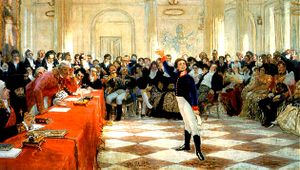
هذه قائمة للمؤلفين الذين قرضوا الشعر بالروسية. ومعظمهم العرق الروسي، إلا أن جماعات عرقية أخرى ممثَلة في القائمة. Besides permanent residents, the list includes those who were born in the Russian Empire, الاتحاد السوڤيتي or Russian Federation but later emigrated, and those who were born elsewhere but immigrated to the country, with the general qualification being that they've written poetry in Russian.
لقائمة النص الصافي، طالع تصنيف:شعراء روس.
انظر أيضاً: قائمة كتاب اللغة الروسية, قائمة روائيي اللغة الروسية، قائمة كتاب المسرحيات باللغة الروسية، قائمة الفنانين الروس، قائمة المعماريين الروس، قائمة المخترعين الروس، قائمة المستكشفين الروس، الأدب الروسي، الثقافة الروسية
. . . . . . . . . . . . . . . . . . . . . . . . . . . . . . . . . . . . . . . . . . . . . . . . . . . . . . . . . . . . . . . . . . . . . . . . . . . . . . . . . . . . . . . . . . . . . . . . . . . . . . . . . . . . . . . . . . . . . . . . . . . . . . . . . . . . . . . . . . . . . . . . . . . . . . . . . . . . . . . . . . . . . . . .
قائمة مرتبة أبجدياً
فهرست: أعلى - 0-9 | ا | ب | ت | ث | ج | ح | خ | د | ذ | ر | ز | س | ش | ص | ض | ط | ظ | ع | غ | ف | ق | ك | ل | م | ن | ه | و | ي
أ
| الصورة | الاسم | أشهر أعماله | نموذج |
|---|---|---|---|

|
Bella Akhmadulina (1937–2010) |
The String The Garden A Guiding Sound Once in December |
"Rain Flogs My Face..." Rain flogs my face and collar-bones, a thunderstorm roars over musts. You thrust upon my flesh and soul, like tempests upon ships do thrust. I do not want, at all, to know, what will befall to me the next – would I be smashed against my woe, or thrown into happiness. In awe and gaiety elated, like a ship, that’s going tempests through, I am not sorry that I’ve met you, and not afraid to love you, too. (Translation by Yevgeny Bonver) |
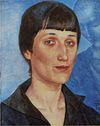
|
Anna Akhmatova (1889–1966) |
Evening Requiem The Rosary Poem Without a Hero |
"Like a White Stone"[1] Like a white stone deep in a draw-well lying, As hard and clear, a memory lies in me. I cannot strive nor have I heart for striving: It is such pain and yet such ecstasy. It seems to me that someone looking closely Into my eyes would see it, patent, pale. And, seeing, would grow sadder and more thoughtful Than one who listens to a bitter tale. The ancient gods changed men to things, but left them A consciousness that smoldered endlessly, That splendid sorrows might endure forever. And you are changed into a memory. |
| Margarita Aliger (1915–1992) |
Zoya Railroad The Year of Birth Stones and Grass |
||
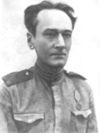
|
Daniil Andreev (1906–1959) |
Russian Gods The Iron Mystery |
|

|
Innokenty Annensky (1855–1909) |
Quiet Songs Cypress Box |
|
| Pavel Antokolsky (1896–1978) |
All We Who in His Name | Hate![2] Hate, be a faithful prop, and find | |

|
Aleksey Apukhtin (1840–1893) |
||
| Eduard Asadov (1923–2004) |
|||
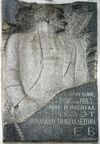
|
Nikolay Aseev (1889–1963) |
Zor Night Flute |
|
| ملف:Auerbach.jpg | Lera Auerbach (born 1973) |
||
| Gennadiy Aygi (1934–2006) |
B
| Portrait | Person | Notable works | Sample |
|---|---|---|---|

|
Eduard Bagritsky (1895–1934) |
February | |

|
Konstantin Balmont (1867–1942) |
Under the Northern Sky Let's Be as the Sun |
Centuries of Centuries Will Pass[1] Long centuries of centuries will pass, unsighted Milleniums as locusts in deathy clouds descend, And in the muttering of centuries affrighted The same enduring firmament will watch the end. The dumb, dead firmament that God will not remember, Who breathes Eternity behind the farther skies, Beyond the fading of the last star's last slow ember, Beyond the utter threshold words may scrutinize. Forever cold, that starry desert, clouds out-topping, Is flung forth, alien to the end, on space, When tearing comet-fires will crumble with it, dropping As dumbly burning tears from a despairing face. |
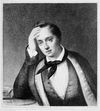
|
Jurgis Baltrušaitis (1873–1944) |
The Pendulum[1] When tne dumb darkness most heavily clings, Rhythmic and ruthless my pendulum swings. Rustily creaking or whining dismay, Urging each tarrying moment away. Longing, it seems, for the days that are fled, Down ancient stairways resounds someone's tread. Heavy the footfall on flagstones unlit, Lower and lower and down to the pit. Praying, it seems, for a long-vanished shore, Dumbly the Helmsman with slow stubborn oar Brokenly rows me, morosely alone, Into my harbor, afar and unknown. Evil the Ferryman, darkly he pounds; Farther and farther, more muffled resounds, Hostile and hopeless, the long downward climb: Cold, ineluctable footsteps of Time. | |
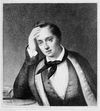
|
Evgeny Baratynsky (1800–1844) |
Eda The Gypsy The Last Poet Autumn |
Be Mirthful Now[3] Be mirthful now, for nothing stays, Our good and evil both are brief. Capricious Fate leads many ways, Sometimes to joy, sometimes to grief, And is no friend to constancy. Listen, you whose lives are bright, For the uncertain hours be Winged for flight. Do not repine, since nothing stays; What matter if it chance at last That unexpectedly our days By cruel sorrow are o'ercast? Upon this changeful earth of ours, The gods from pain took half its stings When alike to all the hours They gave wings. |
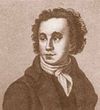
|
Ivan Barkov (1732–1768) |
Luka Mudischev | |
| Agniya Barto (1906–1981) |
Toys Mishka the Petty Thief |
||

|
Alexander Bashlachev (1960–1988) |
||
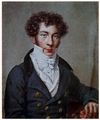
|
Konstantin Batyushkov (1787–1855) |
||
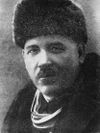
|
Demyan Bedny (1883–1945) |
No One Knew[2] (April 22, 1870) | |
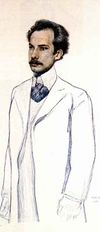
|
Andrey Bely (1880–1934) |
Urn Gold in Azure Christ Has Risen The First Encounter |
Euthanasia[1] The shining and ponderous goblet I empty: the earth drops below me, All things sink away, I am treading Cold space the vast void the dim ether. But distant, in ancient space looming, My glimmering goblet: the Sun. I look far below me are lying The rivers, the forests, the valleys, Estranged in the vanishing distance. A cloud, blowing fog on my eyelids, Trails gossamer gold in its going. The flickering landscape is burning Its last: mid-day stars newly-kindled Look into my soul, sparkling: "Welcome," With radiance silently streaming: "The end of long wanderings, brother, Lies here, in your motherland, welcome!" Slow hour upon hour in procession, Slow centuries, smiling, pass onward. In ancient space proudly I lift it, My glimmering goblet: the Sun. |
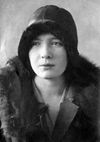
|
Olga Berggolts (1910–1975) |
||
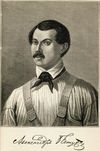
|
Aleksandr Bestuzhev (1797–1837) |
Kabardinian song[4] "On Kazbek the clouds are meeting, | |
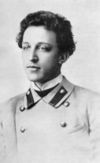
|
Alexander Blok (1880–1921) |
"Into Crimson Dark"[1] Into crimson dark thou goest, Thy vast orbits mock the eye. Small the echo that thou throwest, Far, I hear thy footfalls die. Art thou near? too far for greeting? Lost in topless altitudes? Shall I wait a sudden meeting Where sonorous stillness broods? In the solitude resounding Distant footsteps echo free. Is it thou who flamest, bounding Circles of infinity? | |
| Valeri Brainin-Passek (born 1948) |
|||
| Joseph Brodsky (1940–1996) |
|||
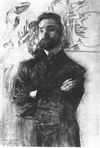
|
Valery Bryusov (1873–1924) |
The Fierce Birds[1] Kindling the air, fierce birds with feathers of fire, Through the white portals of Paradise flamed like desire. Virgin vistas reared, lit with quivering red, And beyond seas were the trackless wanderers fled. But on the pillars of marble, on the threshold were thrown Crimson shadows incredible, sunk in the stone. And, under the arch, in eternity's radiance hidden, Angels exulted in fruits that are secret and sweet and forbidden. | |

|
Ivan Bunin (1870–1953) |
In An Empty House[1] From the walls the paper's blue is vanished, The daguerreotypes, the ikons banished. Only there the deepened blue appears Where these hid it, hanging through the years. From the heart the memory is perished, Perished all that long ago it cherished! Those remain, of whom death hides the face, Leaving their yet unforgotten trace. |
. . . . . . . . . . . . . . . . . . . . . . . . . . . . . . . . . . . . . . . . . . . . . . . . . . . . . . . . . . . . . . . . . . . . . . . . . . . . . . . . . . . . . . . . . . . . . . . . . . . . . . . . . . . . . . . . . . . . . . . . . . . . . . . . . . . . . . . . . . . . . . . . . . . . . . . . . . . . . . . . . . . . . . . .
C
| Portrait | Person | Notable works | Sample |
|---|---|---|---|
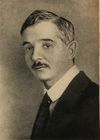
|
Sasha Cherny (1880–1932) |
||
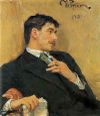
|
Korney Chukovsky (1882–1969) |
Aybolit Wash'em'clean The Crocodile The Giant Roach |
|

|
Georgy Chulkov (1879–1939) |
Purple Autumn[1] Purple Autumn unloosened her tresses and flung them On the heavens and over the dew-heavy fields. She came as a guest to the old, silent house, Singeing the grasses with red; Through the garden she moved,- Up the balcony; scarcely she touched The fragile old rails. She pushed the door-panel softly, Softly she entered the room, Sprinkling the rugs with her sun-yellow dust, Dropped a red leaf upon the piano. . . Ever after that hour, we heard her unceasing, her tireless rustling, Rustle and stir and soft whisper. And our hands suddenly met With no new words, new and forever false. |
D
| Portrait | Person | Notable works | Sample |
|---|---|---|---|
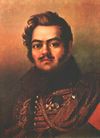
|
Denis Davydov (1784–1839) |
||

|
Anton Delvig (1798–1831) |
Ah, You Night...[4] Ah, you night, you little night! Ah, you night, you stormy night! Why from early evening tide Even to the midnight late Twinkle not your little stars, Shineth not your full-orbed moon? You are veiled with darkling clouds! 'T is with you, I think, O night, Even as with me, young man, Villain grief has called on us! When the dire one takes abode Somewhere deep within the heart, You forget the lasses fair, Dances and obeisances; You forget from evening tide Even to the midnight late, Singing songs, to take delight In the chorus and the dance. No, you sob, you weep aloud, And, a sad and lonely lad, You upon your coarse straw bed Throw yourself as in the grave! | |
| Andrei Dementyev (born 1928) |
|||
| Regina Derieva (born 1949) |
|||

|
گاڤريلا درژاڤن (1743–1816) |
سيل الزمن[5] سيل الزمن، بتقدمه الكاسح، يأخذ معه أعمال الرجال، وكل ما صنعه البشر، ويلقي بها في هاوية الضياع الشعوب والممالك مع ملوكهم. If for a space amidst the swirl The lyre or trumpet some sustain, They're swept at last in ceaseless whirl, And none escape Fate's common main. | |
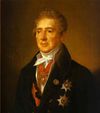
|
Ivan Dmitriev (1760-1837) |
The Little Dove[6] The little dove, with heart of sadness, In silent pain sighs night and day; What now can wake that heart to gladness? His mate beloved is far away. He coos no more with soft caresses, No more is millet sought by him, The dove his lonesome state distresses, And tears his swimming eyeballs dim. From twig to twig now skips the lover, Filling the grove with accents kind, On all sides roams the harmless rover, Hoping his little friend to find. Ah! vain that hope his grief is tasting, Fate seems to scorn his faithful love. And imperceptibly is wasting, Wasting away, the little dove! At length upon the grass he threw him, Hid in his wing his beak and wept; There ceased his sorrows to pursue him, The little dove for ever slept. His mate, now sad abroad and grieving, Flies from a distant home again. Sits by her friend, with bosom heaving, And bids him wake with sorrowing pain. She sighs, she weeps, her spirits languish. Around and round the spot she goes; Ah! charming Chloe 'slost in anguish, Her friend wakes not from his repose! | |
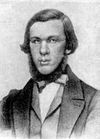
|
Nikolay Dobrolyubov (1836–1861) |
Death’s Jest[7] What if I die? ‘Twere little grief! But one fear wrings my breast- Perhaps Death, too, may play on me A grim, insulting jest. I fear that over my cold corpse Hot tears may fall in showers; That someone, with a foolish zeal, May heap my bier with flowers; That friends may crowd behind my hearse With thoughts of grief sincere, And when I lie beneath the mould, Men’s hearts may hold me dear; That all which I so eagerly And vainly used to crave In life, may brightly smile on me When I am in my grave! | |
| Yevgeniy Dolmatovsky (1915–1994) |
|||
| Yulia Drunina (1924–1991) |
E
| Portrait | Person | Notable works | Sample |
|---|---|---|---|

|
Ilya Ehrenburg (1891–1967) |
The Tree[2] The meek dew shone, the grass lay prostrate |
F
| Portrait | Person | Notable works | Sample |
|---|---|---|---|

|
Afanasy Fet (1812–1892) |
A Russian Scene[5] Wondrous the picture, How homelike to me!— Distant plain whitening, Full moon on the lea; Light—in the heavens high, And snow flashing bright; Sledge in the distance In its lonely flight. | |
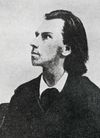
|
Konstantin Fofanov (1862–1911) |
The Beggar[8] There stood a beggar asking alms By the cathedral gate, His face bore torture marks of life— Pale, tired, blind—like fate. Thin, tired, pale and blind he begged A crust of bread alone. And some one pausing, placed within His outstretched hand—a stone. And even so I asked your love, I brought my dreams, my life—the while Unto my passion you replied Only with your cold smile! |
G
| Portrait | Person | Notable works | Sample |
|---|---|---|---|

|
Cherubina de Gabriak (1887–1928) |
||
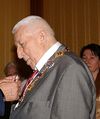
|
Rasul Gamzatov (1923–2003) |
||
| Mikhail Gerasimov (1889–1939) |
|||
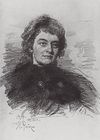
|
Zinaida Gippius (1869–1945) |
"I Seek For Rhythmic Whisperings"[1] I seek for rhythmic whisperings Where noises bandy For life I listen wistfully In footless banter. I cast wide nets and tentative In lakes of sorrow. I go toward final tenderness By pathways sordid. I look for dewdrops glistering In falsehood's gardens. I save truth's globules glistening, From dust-heaps garnered. I fain would fathom fortitude Through years of wormwood And pierce the mortal fortalice, Yet live, a worldling. My cup, through ways impassable, To bear, untainted; By tenebrous bleak passages To joy attaining. | |
| Nikolay Glazkov (1919–1979) |
|||

|
Fyodor Glinka (1786–1849) |
Moscow[4] Wondrous city, ancient city, Thou enfoldest in thy walls Villages and smiling suburbs, Churches, palaces and halls. Thou art girt by grassy meadows, Gay with gardens, rich in flowers; Seven the hills are which thou crownest With thy temples, with thy towers. Thou unfoldest like a parchment Written by a giant hand, And beside thy little river Thou art glorious now and grand. Many are thine ancient churches Towering like the northern pine; Where can eye see streets so noble, Mother Moscow, as are thine? Capture Moscow's mighty Kremlin? Who on earth would boast the power? Who could rob the golden bonnet From the slender Ivan tower? Who could ever swing the Tsar-bell, Or the Tsar-gun overthrow? Reverence at the sacred gateway Who could ever fail to show? In thine awful hour of peril, When thy haughty neck was bent, All thy children, men of Russia, Felt with thee the punishment. White-walled city, them wast chastened Like a martyr in the fire; And thy river, boiling, hastened Onward to escape the pyre. Once a captive and dishonoured, In thine embers thou didst lie! Now arisen from thine ashes Changeless, lift thy head on high! Flourish through the countless ages, | |

|
Nikolay Gnedich (1784–1833) |
The Fishers | |
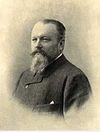
|
Arseny Golenishchev-Kutuzov (1848–1913) |
||

|
Sergey Gorodetsky (1884–1967) |
||

|
Boris Golovin (born 1955) |
||

|
Aleksandr Griboedov (1794–1829) |
||
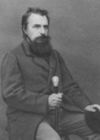
|
Apollon Grigoryev (1822–1864) |
||
| Oleg Grigoryev (1943–1992) |
|||

|
Isabella Grinevskaya (1864–1944) |
"The Mother" [9] (World War 1) O Son of mine, forgive these tears. The tears that from my heart are wrung! E'en birch-trees for their reft boughs weep, The wild beasts for their young. And, dearest, how should I not weep? Nor dolorous grief o'er me prevail? Where strength and calm endurance draw To choke... a mother's wail? In offering to our native land We needs must of our own will part With what is lovelier than life. E'en though it break our heart. And so I freely offer thee To deadly battle with the foe. Though dearer to me than my life. Farewell! God with thee! Go! | |

|
Semyon Gudzenko (1922–1953) |
||
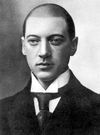
|
Nikolay Gumilyov (1886–1921) |
Evening[2] With heaviness this wingless wind is cursed, |
. . . . . . . . . . . . . . . . . . . . . . . . . . . . . . . . . . . . . . . . . . . . . . . . . . . . . . . . . . . . . . . . . . . . . . . . . . . . . . . . . . . . . . . . . . . . . . . . . . . . . . . . . . . . . . . . . . . . . . . . . . . . . . . . . . . . . . . . . . . . . . . . . . . . . . . . . . . . . . . . . . . . . . . .
I
| Portrait | Person | Notable works | Sample |
|---|---|---|---|

|
Vera Inber (1890–1972) |
||
| Mikhail Isakovsky (1900–1973) |
|||

|
Georgiy Ivanov (1894–1958) |
||
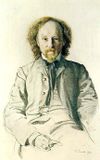
|
Vyacheslav Ivanov (1866–1949) |
Complaint[1] Your soul, born deaf and blind, inhabits Jungles of sunless reverie, Where with the crash of trampled saplings Wild droves of dark desires roam free. A torch I kindled in the darkness To lead you to my starry gate, With seeds of light in shining handfuls The furrows of your night to sate. I stand amid the trackless stretches And hail you in the wilderness; But lost in dark and dreary caverns My cry sinks silent, answerless. | |

|
Ryurik Ivnev (1891–1981) |
K
| Portrait | Person | Notable works | Sample |
|---|---|---|---|

|
Gavril Kamenev (1772–1803) |
||
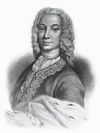
|
Antiokh Kantemir (1708–1744) |
||
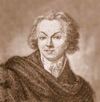
|
Vasily Kapnist (1758–1823) |
On Julia's Death[6] The evening darkness shrouds The slumbering world in peace, And from her throne of clouds Shines Luna through the trees. My thoughts in silence blend. But gathered all to thee: Thou moon! the mourner's friend, Oh, come and mourn with me! Upon her grave I bow, The green grave where she lies: Oh, hear my sorrows now, And consecrate my sighs! This is her ashes' bed,— Here her cold relics sleep,— Where I my tears shall shed. While this torn heart can weep. O Julia! Never rose Had half the charms of thee! My comfort, my repose,— Oh, thou wert all to me I But thou art gone, and I Must bear life's load of clay,— And pray, and long to die, Though dying day by day. But I must cease to sing. My lyre all mute appears. Alas! Its plaintive string Is wetted with my tears. Oh! Misery's song must end,— My thoughts all fly to thee: Thou moon! The mourner's friend, Oh, come and mourn with me! | |
| Rimma Kazakova (born 1931) |
|||
| ملف:Kedrin Dmitrij Borisovich.jpg | Dmitri Kedrin (1907–1945) |
||
| Bakhyt Kenjeev (born 1950) |
|||
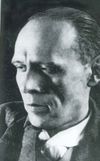
|
Daniil Kharms (1905–1942) |
||

|
Ivan Khemnitser (1745-1784) |
The Lion's Council of State[6] A lion held a court for state affairs: Why? That is not your business, sir, 'twas theirs! He called the elephants for counsellors—still The council-board was incomplete; And the king deemed it fit With asses all the vacancies to fill. Heaven help the state—for lo! the bench of asses The bench of elephants by far surpasses. He was a fool, the foresaid king, you'll say: Better have kept those places vacant surely, Than fill them up so poorly. O no! that's not the royal way; Things have been done for ages thus,— and we Have a deep reverence for antiquity: Naught worse, sir, than to be, or to appear Wiser and better than our fathers were. The list must be complete, even though you make it Complete with asses; for the lion saw Such had for ages been the law,— He was no radical to break it! "Besides," he said, "my elephants' good sense Will soon my asses' ignorance diminish, For wisdom has a mighty influence." They made a pretty finish! The asses' folly soon obtained the sway: The elephants became as dull as they! | |
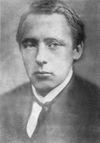
|
Velemir Khlebnikov (1885–1922) |
||
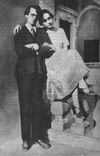
|
Vladislav Khodasevich (1886–1939) |
The Cork[2] O cork that stoppered the strong iodine, | |
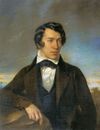
|
Aleksey Khomyakov (1804–1860) |
||
| Semyon Kirsanov (1906–1972) |
|||
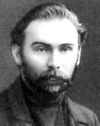
|
Nikolay Klyuev (1884–1937) |
A Northern Poem[1] Sunset dreams on fir-tree cones, Green the hedge, and brown the field; Mossy rifts in weathered stones Meekly vernal waters yield. Oh, look up the wooded steep God has touched it with his palm; Piously wild berries weep, listening to the grassy psalm. And I feel no fleshly tie; And my heart's a springing mead. Come, ye pilgrims white and shy, Peck the early wheaten seed. Tender evening twilight searches Cottage windows, gabled byres, And the leaves of slender birches Glimmer soft as wedding fires. | |
| Pavel Kogan (1918–1942) |
|||

|
Aleksey Koltsov (1809–1842) |
An Old Man's Song[1] I shall saddle a horse, A swift courser, he, I shall fly, I shall rush, As the hawk is keen, Over fields, over seas, To a distant land. I shall overtake there My young youth again. I shall make myself spruce Be a blade again, I shall make a fine show For the girls again. But alas! no road leads To the past we've left, And the sun will not rise For us in the west. | |
| Naum Korzhavin (born 1925) |
|||

|
Ivan Kozlov (1779–1840) |
||
| Vasili Krasovsky (1782–1824) |
|||

|
Aleksey Kruchenykh (1886–1968) |
||
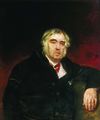
|
Ivan Krylov (1769–1844) |
A Swan, a Pike, and a Crab[5] Whene'er companions don't agree, They work without accord; And naught but trouble doth result, Although they all work hard. One day a Swan, a Pike, a Crab, Resolved a load to haul. All three were harnessed to the cart, And pulled together all. But though they pulled with all their might, That cart-load on the bank stuck tight. The Swan pulled upwards to the skies, The Crab did backwards crawl, The Pike made for the water straight: This proved no use at all. Now, which of them was most to blame Tis not for me to say, But this I know—the load is there Unto this very day. | |

|
Wilhelm Küchelbecher (1797–1846) |
||
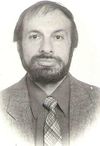
|
Anatoly Kudryavitsky (born 1954) |
||

|
Nestor Kukolnik (1809–1868) |
||
| Alexander Kushner (born 1936) |
|||

|
Dmitry Kuzmin (born 1969) |
||
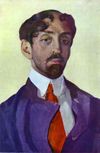
|
Mikhail Kuzmin (1872–1936) |
"Now Dry Thy Eyes"[1] Now dry thy eyes, and shed no tears. In heaven's straw-pale meadows veers Aquarius, and earthward peers, His emptied vessel overturning. No storming snows, no clouds that creep Across the sheer pure emerald steep, Whence, thinly-drawn, a ray darts deep As a keen lance with edges burning. |
L
| Portrait | Person | Notable works | Sample |
|---|---|---|---|
| Vasily Lebedev-Kumach (1898–1949) |
|||
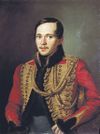
|
Mikhail Lermontov (1814–1841) |
Borodino The Song of the Merchant Kalashnikov Demon Valerik Death of the Poet |
The Cup of Life[1] We drink life's cup with thirsty lips, Our eyes shut fast to fears; About the golden rim there drips Our staining blood, our tears. But when the last swift hour comes on, The light long hid is lit, From startled eyes the band is gone, We suffer and submit. It is not our part to possess The cup that golden gleamed. We see its shallow emptiness: We did not drink we dreamed. |
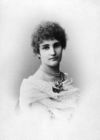
|
Mirra Lokhvitskaya (1869–1905) |
And Moan of Winds...[10] And moan of winds and whispered thoughts of gloom, From life no joy is won . . . Yet somewhere,—warmth, and ocean's muffled boom. And lustre of the sun. The blizzard wails, and in the heart it throws A load of tears unshed. Yet somewhere myrtle, verdant myrtle grows. And stainless roses spread. Life, passing by, in empty brooding delves, Unmeaning, unbedight . . . Yet somewhere, mirth and bliss will yield themselves, And comeliness and light! | |
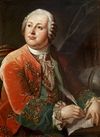
|
Mikhail Lomonosov (1711–1765) |
||
| Vladimir Lugovskoy (1901–1957) |
|||

|
Eduard Limonov (born 1943) |
M
| Portrait | Person | Notable works | Sample |
|---|---|---|---|
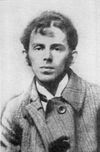
|
Osip Mandelstam (1891–1938) |
Stalin Epigram | "The Air Strikes Chill"[2] The air strikes chill. Although transparent spring |
| Gregory Margovsky (born 1963) |
|||
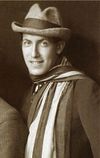
|
Anatoly Marienhof (1897–1962) |
"Savage, Nomad Hordes"[1] Savage, nomad hordes Of Asia Poured fire out of the vats! Razin's execution is avenged, And Pugachov's pain Whose beard was torn away. Hooves Have broken The scruff of the earth, Cold with centuries, And the supernal sky, like a stocking With a hole in its heel Has been taken out of the laundry-trough Wholly clean. | |

|
Samuil Marshak (1887–1964) |
||
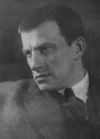
|
Vladimir Mayakovsky (1893–1930) |
Moonlit Night[2] (A Landscape) | |
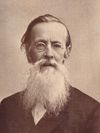
|
Apollon Maykov (1821–1897) |
The Alpine Glacier[5] Dank the darkness on the cliff-side; Faintly outlined from below, In their modest maiden gladness, Glaciers in the dawn's blush glow. What new life upon me blowing, Breathes from yonder snowy height, From that depth of limpid turquoise Flashing in the morning light? There, I know, dread Terror dwelleth. Track of man there is not there; Yet my heart in answer swelleth To the challenge, "Come thou here!" | |
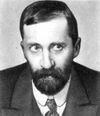
|
Dmitriy Merezhkovsky (1866–1941) |
The Curse of Love[1] With heavy anguish, hopeless straining, The bonds of love I would remove. Oh, to be loosed from their enchaining! Oh, freedom, only not to love! The soul that shame and fear are scourging Crawls through a mist of dust and blood. From dust, great God, my spirit purging, Oh, spare me from love's bitter flood! Is pity's wall alone unshaken? I pray to God, I cry in vain, More weary, by all hope forsaken; Resistless love grows great again. There is no freedom, unforgiven, We live as slaves, by life consumed; We perish, tortured, bound and driven, Promised to death, and to love doomed. | |
| Arvo Mets (1937–1997) |
|||

|
Lev Mei (1822–1862) |
||
| Alexander Mezhirov (1923–2009) |
|||

|
Sergey Mikhalkov (born 1913) |
||

|
Nikolai Minsky (1855–1937) |
Force[1] She lies, opening her teats, strong, swollen, wide, And at her breasts, their equal gift bestowing, Mad Nero and meek Buddha clutch, unknowing, As clinging twins who suckle side by side. She holds two vessels, whence, forever flowing, The streams of Life and Death serenely glide. She breathes and wreaths of stars are lit, and bide, She breathes anew: they fly like sere leaves blowing. She looks ahead with cold unseeing eyes; She cares not though she bear or cause to perish; The children whom she nurtures she will cherish, But when she weans them, every claim denies. Evil and Good gather them in thereafter And play the cosmic game with idle laughter. | |
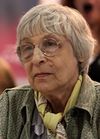
|
Yunna Morits (born 1937) |
N
| Portrait | Person | Notable works | Sample |
|---|---|---|---|
| Vladimir Nabokov (1899–1977) |
|||
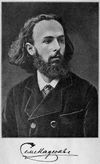
|
Semyon Nadson (1862–1887) |
"Pity the Stately Cypress Trees"[5] Pity the stately cypress trees; How freshly green they spring! Ah! why amidst their branches, child, Have you put up your swing? Break not a single fragrant bough. Oh, take thy swing away To heights where thick acacias bloom; Mid dusty olives play! Thence you can see the Ocean, And, as your swing ascends, Through greening boughs a sunny glimpse The sea in laughter sends Of white sails in the distance dim, Of white gulls far away, Of white flakes foaming on the sands, A fringe of snowy spray. | |
| Vladimir Narbut (1888–1938) |
|||
| Sergey Narovchatov (1919–1981) |
|||

|
Nikolay Nekrasov (1821–1877) |
The Russian Soldier[5] Then up there comes a veteran, With medals on his breast; He scarcely lives, but yet contrives To drink with all the rest. "A lucky man am I," he cries, And thus to prove the fact he tries. "In what consists a soldier's luck? Pray, listen while I tell. In twenty fights, or more, I've been, And yet I never fell. And, what is more, in peaceful times Full meal I never knew; Yet, all the same, I have contrived Not to give Death his due. Again, for sins both great and small, Full many a time they've me With canes unmercifully flogged, Yet I'm alive, you see!" | |
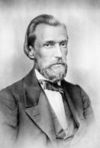
|
Ivan Savvich Nikitin (1824–1861) |
Gossip[8] Though blameless thy living As Anchorite's fate, Yet gossip will find thee Or early or late. Through keyhole he enters And stands at thy side, Doors of wood nor of stone Against him provide. He pulls the alarm bell At slightest excuse- And down to thy grave Will pursue with abuse. Self defence nothing boots thee, Thy flight he will worst- To earth he will tread thee, O Gossip be cursed! |
O
| Portrait | Person | Notable works | Sample |
|---|---|---|---|

|
Nikolay Ogarev (1813–1877) |
The Village Watchman[4] The night is dark, and clouds abound, Appears the white snow everywhere; The crackling frost pervades the ground, And frigid is the atmosphere. On either side the long, broad street The peasants' cottages are seen; The solitary watchman's feet Are heard, as he moves on between. Cold is he now; the hollow gale Fills with violent blast the air; The frost has touched his visage pale, And whitened all his beard and hair. Joy has fled from his gloomy brow, He finds it hard to be alone; Through the dark night, and blinding snow, His song resounds with mournful tone. By moonless nights he paces late, Watching until the morn comes round; His hammer upon the iron plate Gives out a dreary, dismal sound. And swaying ever to and fro, The board prolongs its dreadful moan; The heart dies down with feelings low, And sorrow weighs it, lorn and lone. | |

|
Irina Odoyevtseva (1895–1990) |
||

|
Bulat Okudzhava (1924–1997) |
P
Where a worn poplar age has grizzledScreens the moon's strip of fallow light,
Where the pond lies, an open secret,
Where apple bloom is surf and sigh,
And where the garden, a lake dwelling,
| Portrait | Person | Notable works | Sample |
|---|---|---|---|
| Valentin Parnakh (1891–1951) |
|||
| align=center | Mariya Petrovykh (1908–1979) |
||
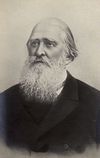
|
Aleksey Plescheev (1825–1893) |
Passion[5] Ah! could I but utter in song All the anguish which robs me of peace, Thy sorrow of soul would be stilled, Thy murmur of doubting would cease! I would breathe forth my life, my beloved. As I told all my pain for thy sake; And, bursting in passionate song. My heart in its fulness would break. | |

|
Pyotr Pletnyov (1792–1866) |
||
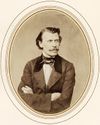
|
Yakov Polonsky (1819–1898) |
A Gipsy Song[8] Pile of embers in the darkness, Sparks expire as they fly Night conceals us from the passing, On the bridge we'll say good-by! At the parting, shawl of crimson Cross my shoulders thou shalt lace, At an end the days swift passing, Met within this shaded place. In the morning, with first splendour. All my life compelled to rove I shall leave with other gipsies Seeking happiness and love. How does fate foretell my future? Who, to-morrow by my side, O'er my heart will loose with kisses Knots by thy dear hand fast tied? Flash of embers in the darkness, Sparks expire as they fly Night conceals us from the passing, On the bridge we'll kiss good-by! | |

|
Nikolay Popovsky (1730–1760) |
||
| Vasili Popugaev (1778 or 1779 – c. 1816) |
|||
| Alexander Prokofyev (1900–1971) |
|||
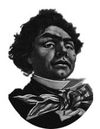
|
Kozma Prutkov (1817–1875) |
||
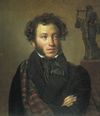
|
Alexander Pushkin (1799–1837) |
Eugene Onegin | From Eugene Onegin[8] Lensky and Olga Sometimes he read aloud with Olga A latter day romance discreet, Whose author truly painted nature, With cunning plot, insight complete; Oft he passed over a few pages, Too bald or tasteless in their art And coloring, began on further, Not to disturb the maiden heart. Again, they sat for hours together, With but a chess board to divide She with her arms propped on the table, Deep pondering, puzzled to decide Till Lensky from his inward storm Captured her castle with his pawn! |

|
Vasily Pushkin (1766–1830) |
R
| Portrait | Person | Notable works | Sample |
|---|---|---|---|
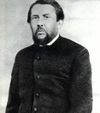
|
Vladimir Raevsky (1795–1872) |
||
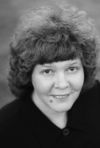
|
Irina Ratushinskaya (born 1954) |
||
| Yevgeny Rein (born 1935) |
|||

|
Yevdokiya Rostopchina (1812–1858) |
||
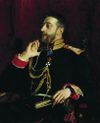
|
Konstantin Romanov (K.R.) (1858–1915) |
Love's Reason Why[5] For beauty love me not! Nor love for gold! For beauty—love the Day— For wealth—love coinage cold! Nor love me for my youth! For Youth—love spring! But love—because to you With constant love I cling. | |
| Vsevolod Rozhdestvensky (1895–1977) |
|||
| Robert Rozhdestvensky (1932–1994) |
|||
| Nikolay Rubtsov (1936–1971) |
|||

|
Kondraty Ryleyev (1795–1826) |
S
| Portrait | Person | Notable works | Sample |
|---|---|---|---|
| David Samoylov (1920–1990) |
|||

|
Genrikh Sapgir (1928–1999) |
||
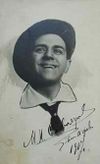
|
Mikhail Savoyarov (1876–1941) |
||
| Ilya Selvinsky (1899–1968) |
|||

|
Igor Severyanin (1887–1941) |
A Russian Song[1] Lace and roses in the forest morning shine, Shrewdly the small spider climbs his cobweb line. Dews are diamonding and blooming faery-bright. What a golden air ! What beauty ! Oh, what light ! It is good to wander through the dawn-shot rye, Good to see a bird, a toad, a dragon-fly; Hear the sleepy crowing of the noisy cock, And to laugh at echo, and to hear her mock. Ah, I love in vain my morning voice to hurl, Ah, off in the birches, but to glimpse a girl, Glimpse, and leaning on the tangled fence, to chase Dawn's unwilling shadows from her morning face. Ah, to wake her from her half-surrendered sleep, Tell her of my new-sprung dreams, that lift and leap, Hug her trembling breasts that press against my heart, Stir the morning in her, hear its pulses start. | |
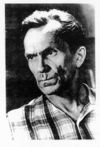
|
Varlam Shalamov (1907–1982) |
||

|
Shchepkina-Kupernik (1874–1952) |
||
| Vadim Shefner (1915–2002) |
|||

|
Nikolay Sherbina (1821–1869) |
Earth[11] Do you remember, dear-or care? When I was but a little thing, Among the garden-blossoms, there, I brushed a bee and took its sting: My finger pained me. Quick and hot, My tears ran like a rivulet. You laid upon the aching spot A lump of brown earth, cool and wet… And, all at once, there was no pain! And you looked on, with your kind eyes, To see me at my sport, again, Of chasing dappled butterflies. That time is long and long since flown; But I received a later dart… Oh, my dear friend, to you I own, It is Love’s shaft within my heart! So be it!-now I only crave The perfect cure that with you lies- A little cool earth from your grave Above this heart, upon these eyes. | |

|
Vadim Shershenevich (1893–1942) |
||

|
Gennady Shpalikov (1937–1974) |
||

|
Konstantin Simonov (1915–1979) |
||

|
Stepan Skitalets (1869–1941) |
Recited at a charity event, 1902.[12] A shadow falls upon your heads, You will not like my song; The emptiness inside you spreads- It will not spread for long. Of you, the world has had enough, The years will soon be free Of you, and made of finer stuff- Life waits for men like me. | |
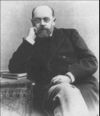
|
Konstantin Sluchevsky (1837–1904) |
||
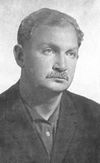
|
Boris Slutsky (1919–1986) |
||
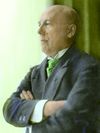
|
Fyodor Sologub (1863–1927) |
The Amphora[1] In a gay jar upon his shoulder The slave morosely carries wine. His road is rough with bog and boulder, And in the sky no starlights shine. Into the dark with stabbing glances He peers, his careful steps are slow, Lest on his breast as he advances The staining wine should overflow. I bear my amphora of sorrow, Long brimming with the wine it hides; There poison for each waiting morrow Ferments within the painted sides. I follow secret ways and hidden To guard the evil vessel, lest A careless hand should pour unbidden Its bitterness upon my breast. | |
| Vladimir Soloukhin (born 1924) |
|||

|
Vladimir Solovyov (1853–1900) |
"Below the Sultry Storm"[1] Below the sultry storm that seemed to lower, An alien force, again I heard the call Of my mysterious mate: the prisoned power Of old dreams flared and flickered in its fall. And with a cry of horror and of dolor- As of an eagle in an iron vise- My spirit shook its cage in quivering choler, And tore the net, and issued to the skies. And up behind the clouds, unswerving, bearing,- Before the miracles a flaming sea- Within the shining sanctum briefly flaring, It vanished into white infinity. | |

|
Alexander Sumarokov (1717–1777) |
||
| Mikhail Svetlov (1903–1964) |
T
| Portrait | Person | Notable works | Sample |
|---|---|---|---|
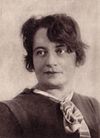
|
Yelizaveta Tarakhovskaya (1891–1968) |
||

|
Arseniy Tarkovsky (1907–1989) |
||
| Nikolay Tikhonov (1896–1979) |
|||

|
Aleksey Tolstoy (1817–1875) |
My Little Almond Tree[1] My little almond tree Is gay with gleaming bloom, My heart unwillingly Puts forth its buds of gloom. The bloom will leave the tree, The fruit, unbidden, grow. And the green boughs will be By bitter loads brought low. | |
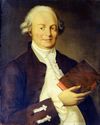
|
Vasily Trediakovsky (1703–1769) |
||

|
Marina Tsvetaeva (1892–1941) |
"No Longer Now"[2] No longer now the same god-given bounties | |

|
Ivan Turgenev (1818–1883) |
||

|
Aleksandr Tvardovsky (1910–1971) |
The Starling[2] On the porch a trooper marvels | |

|
Fyodor Tyutchev (1803–1873) |
Silentium[1] Be silent, hidden, and conceal Whate'er you dream, whate'er you feel. Oh, let your visions rise and die Within your heart's unfathomed sky, Like stars that take night's darkened route. Admire and scan them and be mute. The heart was born dumb; who can sense Its tremors, recondite and tense? And who can hear its silent cry? A thought when spoken is a lie. Uncovered springs men will pollute, Drink hidden waters, and be mute. Your art shall inner living be. The world within your fantasy A kingdom is that waits its Saul. The outer din shall still its call, Day's glare its secret suns confute. Oh, quaff its singing, and be mute. |
U
| Portrait | Person | Notable works | Sample |
|---|---|---|---|
| Vladimir Uflyand (1937–2007) |
|||
| Joseph Utkin (1903–1944) |
The Story About Ginger Motele Mr. Inspector Rabbi Isaiah and Commissar Bloch |
V
| Portrait | Person | Notable works | Sample |
|---|---|---|---|
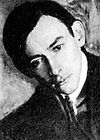
|
Konstantin Vaginov (1899–1934) |
||
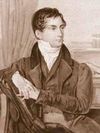
|
Dmitry Venevitinov (1805–1827) |
||

|
Igor Vishnevetsky (born 1964) |
||

|
Dmitry Vodennikov (born 1968) |
||

|
Maksimilian Voloshin (1877–1932) |
Stigmata[1] Whose the flying hands, about me shedding Fire, and leading me on passionate ways? No sonorous stones my feet are treading, But where vatic waters fill the days. Piercing through the spirit, sharp pilasters Rise, and candle sting the dark like bees. Oh, the hearts that bloom like crimson asters, Petalled with gold-bladed ecstasies. Now the evening on the temple flinging Patterned, carven crimson, shines and mourns. Oh, the pale brow to the altar clinging, Stung anew with stinging scarlet thorns! The whole soul, high vaults and portals glowing, Fear like incense swathes with dim blue bands: Ah, I know you, sacred corals, growing On the pierced palms of these outstretched hands. | |

|
أندريه ڤوزنسنسكي (1933–2010) |
||
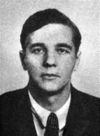
|
Alexander Vvedensky (1904–1941) |
||
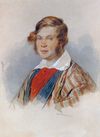
|
Pyotr Vyazemsky (1792–1878) |
Spring[2] "Ah, Spring, sweet Spring, chief pride of Nature!" | |

|
Vladimir Vysotsky (1938–1980) |
Y
| الصورة | الاسم | أشهر أعماله | نموذج |
|---|---|---|---|

|
Pyotr Yakubovich (1860–1911) |
The Ninth Wave[13] Not for every plashing wavelet Watches keen the helmsman’s eye; He awaits the last huge roller, When the ninth wave surges high. But until that last strong roller Swells with deep, decisive roar, We must meet the strife and effort Of the waves that go before. Even though we scarce perceive them, Sinking vanquished to their grave, Wait, O brethren, wait with courage For the ninth, the conqu’ring wave! | |
| Alexander Yashin (1913–1968) |
|||

|
Nikolay Yazykov (1803–1847) |
The Sailor[4] Cruel is our lonely ocean, Roaring always day and night; Buried 'neath its wild commotion Many a wreck lies, far from sight. Courage, comrades! I, confiding, To the free winds give my barque; Forth it hastens, swiftly riding O'er the billows grim and dark. Thick the clouds fly o'er the heaven, Fierce the gale grows, black the waves; Hither, thither we are driven, While the waking whirlwind raves. Courage, comrades ! Peals the thunder, High the watery heaps arise, Yawning gulfs now draw us under, Now we 're lifted to the skies. Yet behold, our ship is nearing Through the storm the wished-for land; See, the vaults of heaven are clearing, See, the port is near at hand. Thither but brave hearts and ready Will the billows speed along! Courage, comrades! straight and steady Flies our vessel, stanch and strong. | |
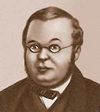
|
Pyotr Yershov (1815–1869) |
The Humpbacked Horse | |
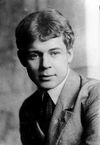
|
Sergey Yesenin (1895–1925) |
"Hopes Painted By The Autumn Cold"[1] Hopes, painted by the autumn cold, are shining, My steady horse plods on, like quiet fate, His moist dun lip is catching at the lining When the coat, flapping, flutters and falls straight. On a far road the unseen traces, leading Neither to rest nor battle, lure and fade; The golden heel of day will flash, receding, And labors in the chest of years be laid. | |

|
Yevgeny Yevtushenko (born 1933) |
ز
| الصورة | الاسم | أشهر أعماله | نموذج |
|---|---|---|---|
| Nikolay Zabolotsky (1903–1958) |
|||
| Boris Zakhoder (1918–2000) |
|||
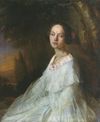
|
Yulia Zhadovskaya (1824–1883) |
The Contrast[14] Dear, you will soon forget me, You I shall ne'er forget, You'll find new loves for old ones, For me love's sun is set. New faces soon will greet you, You'll choose yourself new friends, New thoughts you'll get and haply New joy to make amends: While I in silent sorrow Life's joyless way shall go, And how I love and suffer Only the grave will know. | |
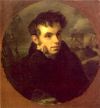
|
Vasiliy Zhukovsky (1783–1852) |
To a Floweret[3] Floweret, faded and forsaken, Fragile beauty of the lea, Autumn's cruel hand hath taken All thy summer charms from thee. Heigho! that the years must bring This same destiny to all; One by one our joys take wing, One by one your petals fall. So each evening rings the knell Of some dream or rapture perished, And the fleeting hours dispel Each some vision fondly cherished. Life's illusions lie unmasked, And the star of hope burns paler. Has not some sage long since asked: Men or blossoms which are frailer? |
المصادر
- ^ أ ب ت ث ج ح خ د ذ ر ز س ش ص ض ط ظ ع غ ف ق ك ل م Modern Russian Poetry, An Anthology, chosen and translated by Babette Deutsch and Avrahm Yarmolinsky, Harcourt, Brace and Co, NY, 1921.
- ^ أ ب ت ث ج ح خ د ذ ر A Treasury of Russian Verse, Yarmolinsky, (free pdf from Archive.org)
- ^ أ ب Poetry and Progress in Russia, Rosa Newmarch, John Lane Company, NY, 1907.
- ^ أ ب ت ث ج Anthology of Russian Literature, Part 2, Leo Wiener, G.P. Putnam's Sons, Ny, 1903.
- ^ أ ب ت ث ج ح خ د Russian Songs and Lyrics, J. Pollen, East and West LTD, London,1916.
- ^ أ ب ت Anthology of Russian Literature, Part 1, G. P. Putnam's Sons, NY, 1903.
- ^ Songs of Russia, Alice Blackwell, Published by the Author, Chicago, 1906.
- ^ أ ب ت ث Russian Lyrics, Martha Bianchi, Duffield and Company, NY, 1910.
- ^ The Soul of Russia, MacMillan, London, 1916.
- ^ Modern Russian Poetry, P. Selver, E.P. Dutton, NY, 1917.
- ^ The Russian Review, Vol 1, No 3, The Russian Review Publishing Company, NY, April 1916.
- ^ from A Writer Remembers, N. Teleshov, Hutchinson Co, NY, Undated.
- ^ The Russian Review, Vol 1, No 2, The Russian Review Publishing Company, NY, March 1916.
- ^ Holy Russia and Other Poems, Oxford University Press, 1918.

